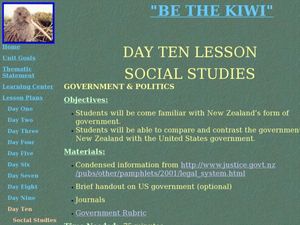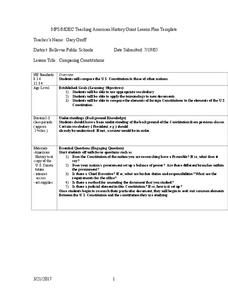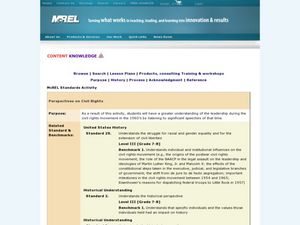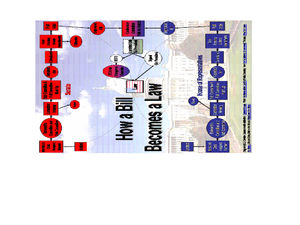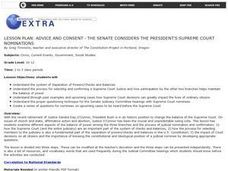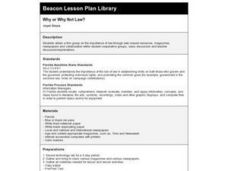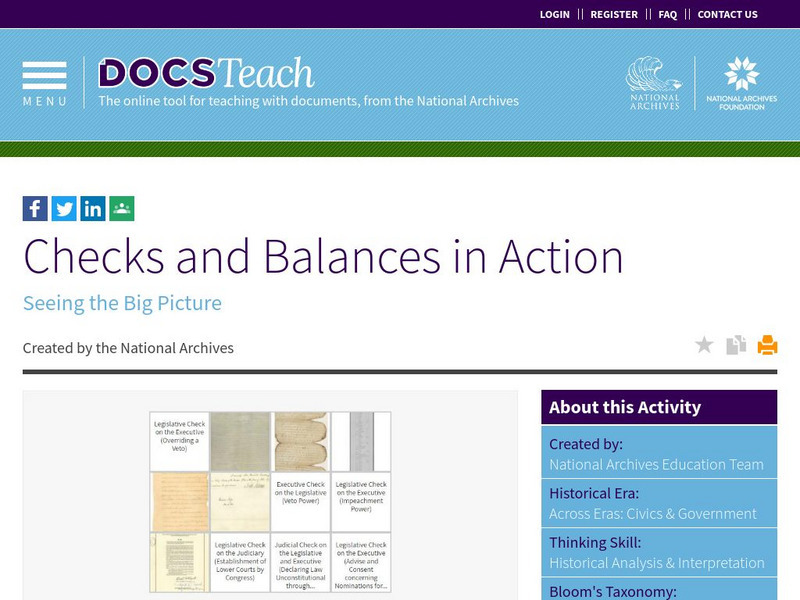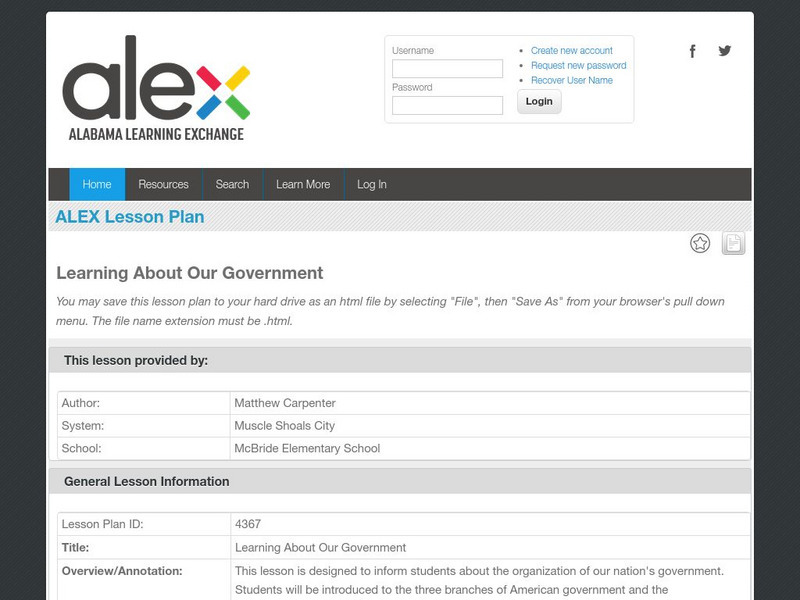Curated OER
Be the Kiwi: Government and Politics in New Zealand
Students examine the structure of government in New Zealand. In this government instructional activity, students listen their instructor present information about the government in New Zealand then create diagrams that compare its...
Curated OER
Comparing Constitutions
Students compare and contrast plans for government. In this government systems lesson, students compare and contrast the U.S. Constitution to the constitutions of selected countries using the provided checklist as a guide. Students...
Curated OER
Perspectives on Civil Rights
Middle schoolers examine speeches of the Civil Rights Era. In this American history lesson, students listen to speeches delivered by Martin Luther King, Jr. and John F. Kennedy. Middle schoolers respond to guiding questions as they...
Curated OER
How Government Works and the Rights of the People
Eighth graders identify how to be responsible citizens. In this civics lesson, 8th graders review websites of congressional members and then create questionnaires about the responsibilities of citizens.
Curated OER
Constitutional Issues: Separation of Powers
Young scholars discribe the principle and the history of separation of powers.
Curated OER
Advice And Consent - the Senate Considers the President's Supreme Court Nominations
Learners study the process and questioning for selecting a Supreme Court Justice. They examine how the decisions of the Supreme Court effect the lives of citizens. They complete worksheets as they study the material.
Khan Academy
Khan Academy: Legitimacy of the Judicial Branch: Lesson Overview
This activity overview from Khan Academy discusses the legitimacy of the judicial branch. This activity is intended for students taking high school or college level American Government and Civics courses, including the AP Government course.
iCivics
I Civics: The Judicial Branch
Young scholars will learn about the federal and state courts and what they do. They will explore the courts' role in fairly settling disputes and administering justice, and the unique role of the U.S. Supreme Court in interpreting the...
iCivics
I Civics: Judicial Branch in a Flash!
In this lesson, learners learn the basics of our judicial system, including the functions of the trial court, the Court of Appeals, and the Supreme Court. They also learn how a case moves up through these levels and discover that these...
iCivics
I Civics: Mini Lesson: Executive Orders
Students discover how presidents use executive orders to wield power and how the legislative and judicial branches support and challenge these measures.
iCivics
I Civics: Marbury v. Madison (1803)
This mini-lesson covers the basics of the Supreme Court's decision that affirmed the Court's power of judicial review. Students learn how Congress tried to add to the Supreme Court's Constitutional power, how the Supreme Court rejected...
iCivics
I Civics: Judicial Review
This lesson plan explores the case that established the power the Supreme Court has today. Learners will learn how the decision in Marbury v. Madison influenced the structure of the third branch, and how the Court's use of judicial...
Alabama Learning Exchange
Alex: Extra! Extra! Supreme Court Case Makes Headlines!
This is a project to conclude the study of the Judicial Branch of our government. The students, working in pairs, will be assigned a landmark Supreme Court case to research in a computer lab setting. They will then construct a one-page...
Other
Usa Gov: Three Branches of Government
Lesson plans for students to learn about the three branches of government. They can find information about the origins of the Constitution, separation of powers, and details about each of the three branches.
iCivics
I Civics: Separation of Powers: What's for Lunch?
Students find out how the three branches of government interact with each other and how decisions about laws are made by several parts of the U.S. government.
PBS
Pbs: How the Supreme Court Affects the Lives of Teens (Lesson Plan)
Objectives for this lesson include describing the structure and function of the Supreme Court, looking at important decisions, and discussing recent rulings and issues.
US National Archives
Docs Teach: Checks and Balances in Action
In this activity, students will analyze documents that span the course of American history to see examples of 'checks and balances' between the legislative, executive, and judicial branches in action. Students will then match the...
US National Archives
Docs Teach: Separation of Powers or Shared Powers
In this activity, students will analyze documents that illustrate the relationship between the legislative, executive and judicial branches. Using the scale in Weighing the Evidence, students will decide whether the United States...
South Carolina Educational Television
Know It All: Government Simulation
Fourth graders will complete a government simulation where they learn about the different responsibilities of each branch of government by becoming the different branches.
iCivics
I Civics: Our Courts: Constitution Day Lesson: Checks and Balances [Pdf]
Students learn the roles and responsibilities of each branch of government and where the checks and balances are located in this role-playing lesson. Requires Adobe Reader.
iCivics
I Civics: Judges: Playing Fair
This mini-instructional activity examines the role of fair and impartial courts in American life. Students learn a basic overview of the judiciary branch, including how judges are appointed and held accountable by citizens.
Alabama Learning Exchange
Alex: Learning About Our Government
This instructional activity is designed to inform students about the organization of our nation's government. Students will be introduced to the three branches of American government and the responsibilities of each. They will discuss...
Center For Civic Education
Center for Civic Education: How Constitution Used to Organize the New Govt [Pdf]
This lesson describes how, using the guidelines provided in the Constitution, the First Congress in April 1789 named the new president and vice president, provided funding for the new government, organized the executive branch, organized...


